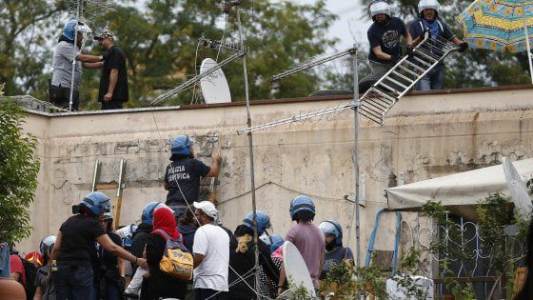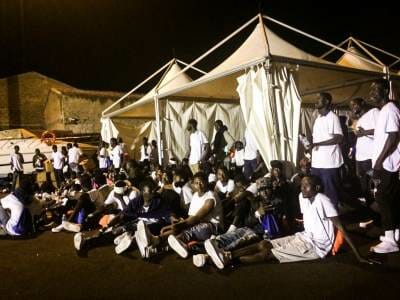The dignity of welcoming and being welcomed
Palermo has been proclaimed the Italian capital of welcome. It is a recognition granted thanks to the city’s reputation as a “melting pot” and thanks also to Mayor Orlando, who has repeatedly and forcefully pushed back against the far-right policies of the Salvini government.
But what does “welcome” mean? A welcome for whom? And where? The port of Palermo has been declared an open port: whoever arrives from the sea will be accepted, will be allowed to disembark. But what happens after landing? Newly arrived migrants will enter the bureaucratic local reception system and will have to deal with the reality of Palermo.
As a social worker I am convinced that for migrants, living in Palermo is in some ways less painful, especially in terms of culture. We are a welcoming people, our city is easily walkable, prices are still reasonable and there are open-air markets, which migrants of all origins can relate to.
But this “welcome” is not wandering the markets or walking through the historic centre. It is vulnerable people, with social, political, financial and health problems. It is also those who work at the reception centres for migrants awaiting their requests for international protection or for those who already have a residence permit. Educators, cultural mediators, psychologists, teachers of Italian as a second language. These are the professionals, social workers who are part of this “welcome”. Thus there are those who are welcomed and those who welcome, two social groups living a reality that is anything but rosy.
In recent years, in Palermo and the surrounding province, the great protagonists of the social work débâcle have been the reception centre staff and those who use those centres.
The main problem gripping managers, supervisors, social workers and users for some time, has been the funding for reception centres, for the provision of services to migrants, and for the social workers who provide those services. This is money coming from the coffers of the city council and from the prefecture, public bodies that act as a bridge between the private companies managing these communities and the funds of the government ministry. The problems surrounding payments to managing bodies and delays in payments to employees has in the last two years created a climate of tension that only those who have experienced the everyday financial insecurity of reception centre staff and users can understand.
It is certainly not because of the recent security decree that centre users and staff have begun to see services become scarce or nonexistent and to experience ever greater insecurity in their already financially precarious lives. However, the changes in regulation have legalised and institutionalised the dysfunction in the system.
According to community managers, delays in payments owed to primary and secondary reception communities, both of unaccompanied minors and adults, are due to the mismanagement of funds and accordingly payments by the city council and the prefecture.
We therefore wanted to question the city council and prefecture about these delays. Indeed the situation is not rosy, but it does not justify cuts to essential professional roles such as cultural mediators and psychologists. Nor does it justify the inadequate qualifications of many social workers, hired because they are willing to accept poor working conditions and turn a blind eye to what goes on within welcome centres, to the detriment of centre users.
The delays in payments, the lack of clarity on the part of centre managers and the collusion of the relevant authorities, nevertheless aware of the problems centres are facing, lead staff to distrust the reception system. They live in situations of permanent vulnerability and are unable to adequately and calmly carry out their work. All this also creates a constant conflict within the communities where staff and service users live their daily lives.
This lack of clarity on the part of the authorities, a lack that also manifests itself in the lack of communication with social workers, conflict with management and the daily stress resulting from the type of work carried out by staff, only increase their frustration and anger. They must decide whether to carry on, often caught between the fear of losing all the work they have done in their communities and the fear of having to confront their employers and demand answers.
Because although this is a great vocation, social workers also have personal lives, they have families, they must pay rent and buy basic necessities. They are people. And a person’s dignity is no joke. This core issue of the right to dignity reemerges forcefully in the thorny matter of service users within the community.
In the name of lack of funds, management often decide to reduce centre costs, further exposing staff to financial risk, by using types of contract at the very limits of legality. They would follow the new Salvini model and turn welcome centres into dormitories: without services, with frustrated staff, ill-prepared and unmotivated; their users angry and with little faith in the future.
Is this then the famous “welcome” of the city of Palermo, extolled from North to South, East to West and beyond the borders of Italy?
“Welcome” cannot and must not remain simply a word. It must be a political will that takes into consideration the dignity of those who work and those who are welcomed. It is not enough to say that our ports are open. It is not enough to say that it is Salvini’s fault, because all of this has been happening for years.
The people who come to our city have needs, first and foremost to start a life with dignity. These people are welcomed in ad hoc structures, where people, professionals in the sector, would like to take care of them and accompany them on their journey towards autonomy in the best possible way. Is this not a job that itself has a right to the return of its dignity?
By Giulia Di Carlo
Translated by Amica Sciortino Nowlan





